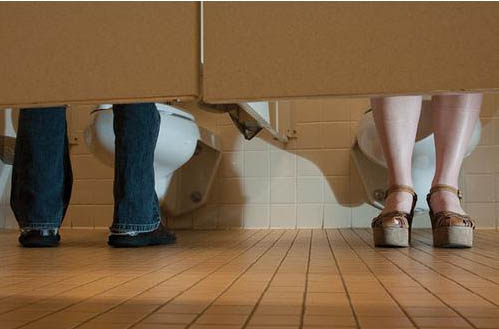Science for the Restroom Wars
 With the passage of a restroom bill by the South Dakota legislature and intense lobbying of the governor either to veto or sign the bill into law, all of the anti-transgender forces have come online to muddy the waters. An example is the recent article in The Federalist.
With the passage of a restroom bill by the South Dakota legislature and intense lobbying of the governor either to veto or sign the bill into law, all of the anti-transgender forces have come online to muddy the waters. An example is the recent article in The Federalist.
I cannot object to people expressing themselves. I firmly believe in the right of free speech. However, I do object to their ignorance and misstatements involving science. Lawmakers will ultimately find that it is nearly impossible to write legislation to prohibit transgender people from using the restroom associated with their gender behavior category based on natal sex. Diversity is a hallmark of life on earth and they will find that it is nearly impossible to draw clear lines. All such laws can be attacked on the basis that their definition of sex is vague and cannot be enforced.
First of all in their writings of legislation and articles there is the usual confounding of the terms sex and gender. We should expect this by now because our culture tends to be cisgender, assuming that sex and gender are aligned. Sex refers to organs and gender refers to behavior but they are often mixed up in the public forum. Despite the statement in the cited article above, gender is the scientific term. They reveal their ignorance of science. Gender was a word that was repurposed from linguistics in the 1960s in order to handle the obvious separability of sex and gender that John Money found in his research with intersex children.
There are also statements to the effect that the sex assigned at birth is immutable even though we know that this is not true. We know that transsexuals can change most of their sex organs including brain, spinal cord, external/internal genitalia, breasts, hair, skin and facial features. There aren’t many sex organs left and many of them have been shown to be transplantable, like uteruses and penises. Last year two babies were born with the aid of transplanted uteruses. Based on success in South Africa, the DOD is preparing to perform at least 60 penile transplants for injured soldiers. How many organs would it take to acknowledge that a person’s sex had been changed?
The contention that sex cannot be changed comes from having only a cursory knowledge of biology. The legislators and writers may have learned some generalizations about genetics but they do not know the details. The Olympics and international athletics have learned the details the hard way that sex cannot be defined.
There are assertions that males always have XY sex chromosomes and females, XX. This is mostly true but there are enough exceptions to eliminate this assertion for laws assigning people to restrooms or making this statement. With regard to chromosomes they assert that males always have XY chromosomes and females XX. That is the cursory science. But there are not just people with XX or XY sex chromosomes; there are XXX, XXY, XYY and all sorts of other variations. There are those with XY chromosomes who have male sex organs because of “Androgen Insensitivity Syndrome.” Then there are people in the case of “XX Male Syndrome” who have male external genitalia and XX chromosomes. There are even intersex conditions where a person’s external genitalia change during puberty from near female to near male. The change makes them male enough to conceive children. The book Middlesex that won a Pulitzer Prize describes this phenomenon from a first person point of view. The Olympics found that chromosomes could not be used for sex determination long ago because of natural diversity.
The assertion in the cited article that every cell in the body has the same chromosomes is not true. You exchange cells with your mother in the womb. The cells that she donates include cells from older brothers and sisters that were left behind in your mother after she gave birth to them. You also get cells from other people during blood transfusions and bone marrow transplants. It has been shown that many of these cells are not rejected by your immune system and that they survive, particularly in the brain. XY cells from male donors have been found in the brain and in bone marrow transplant recipients who have female sex organs and XX chromosomes. The brain seems to be a safe haven for various cells that start out as “foreign” cells. Lastly, the phenomena of mosaicism of chimerism indicate that you can have more than one cell type in the body. Mosaicism occurs as a natural variation in DNA during development. In chimerism, two eggs become fertilized and merge early in pregnancy. The two eggs result in two populations of cells that vary in chromosomes and genes.
If you try to define sex in terms of genes, you run into the 1-3% of live births with indeterminate sex, called “intersex” by some and “differences in sexual development” by others (these are the terms used by the actual people). Sex indeterminacy at birth is not always caused by genes on the X or Y sex chromosome because the recipes for sex organs and sexed bodies are mostly in the 44 non-sex chromosomes. The Y chromosome has been found to have a gene called the SRY gene that kicks off male sex organ development. But it sometimes can be found on the X chromosome or even among the genes in the 44 non-sex chromosomes.
Even if chromosomes and genes could define sex, as a practical matter it would be impractical and an invasion of privacy for all people to be required to undergo karyotyping (chromosome testing) and genome analysis for genes. And it would be more impractical for them to have to carry around the results on paper in order to gain entry to a restroom assigned by law.
Another criteria one might use for defining sex is the inspection of external genitalia. This was tried by the Olympics in the past and rejected because it was not definitive. This is the same sort of “panty test” which doctors do at birth to assign sex but the Olympics ran into similar indeterminacy issues.
One might think that testosterone blood levels could be used to determine sex because “everyone knows” that males have higher levels. That turns out not to be so in many cases. There are some cases where otherwise female people have high levels from the adrenal glands (CAH) or from the ovaries (PCOST). Diabetes also causes fluctuations of testosterone blood levels. In many cases, these diseases are not detected in childhood. And some females just have higher levels without any recognizable disease or physiological mechanism. An international court recently reviewed all the evidence for blood testosterone being used as a sex determination test and banned it from use in the Olympics and international sports.
Okay, how about birth certificates for determining natal sex? Birth certificates turn out to be unreliable. They are typically based on an inspection of external genitalia by a doctor which we have already seen as too unreliable a procedure for the Olympics. And sex markers can be changed on birth certificates in certain states, as transsexuals are well aware. Transsexuals can have the sex indicator changed when they start transition or have GPS (genital plastic surgery), depending on the state in which they were born. Many people do not have an official copy of their birth certificate and it would be a great inconvenience for people to carry them around all the time in order to go to the “right” restroom.
What about driver’s licenses to prove natal sex? Again, transsexuals can have sex markers on these documents changed with proofs, depending on the state. Sometimes all the proof that is needed to change them is a valid passport. Passport markers can be changed with just a letter saying the person intends to live in a different gender from the one assigned at birth. Children do not typically have driver’s licenses and it is not likely that Americans would standup for a cradle-to-grave identification card that must be carried in order to go to restrooms.
There are Federal regulations about restrooms in schools and workplaces which would come into conflict with discriminatory state laws and regulations. Title IX of the Education Act and Department of Labor regulations both support reasonable access to restrooms based on gender behavior category. Public accommodation discrimination is another matter but Federal EEOC interpretations may soon protect transgender people in this area.
There are privacy laws and standards that should preclude such things as genital inspection or divulging sex determination information by medical personnel. Both doctors and nurses take an oath to protect patient information. They may have a legitimate need to collect such information as part of a medical procedure to treat a patient. But collection of such information for non-medical purposes such as assignment to restrooms seems to me to be unethical and may be illegal. At a minimum, the reputation of doctors, nurses and medical institutions will be at stake. And teachers should not be looking at pupils’ private parts because this is an invasion of privacy and because they are not medical experts.
 The restroom discrimination laws will undoubtedly result in multiple lawsuits and great expense for state governments. Grounds for appeals may include conflict with Federal law, invasion of privacy, malpractice and impracticality. In many of these appeals, science could be presented to claim that the statutes are vague about sex determination. Lets hope our judges know or can learn a little science. I have already volunteered with APA to contribute to amicus briefs.
The restroom discrimination laws will undoubtedly result in multiple lawsuits and great expense for state governments. Grounds for appeals may include conflict with Federal law, invasion of privacy, malpractice and impracticality. In many of these appeals, science could be presented to claim that the statutes are vague about sex determination. Lets hope our judges know or can learn a little science. I have already volunteered with APA to contribute to amicus briefs.
Finally, many of the anti-transgender legislators and writers say that they fear the transgender revolution going on. In that their feelings are accurate. They should be very afraid. The revolution started at Compton’s and Stonewall. The revolution has had its ups and downs but we will not go back. We will not allow strip searches and genital inspections that started the Stonewall riots. What would it teach children about America if children and adults have to do this? And we will not carry paperwork around so that we can use restrooms corresponding to our congruent gender behavior category. That smacks of the ubiquitous World War II movie script line: “Papers please.”
Category: Transgender Community News, Transgender Politics











